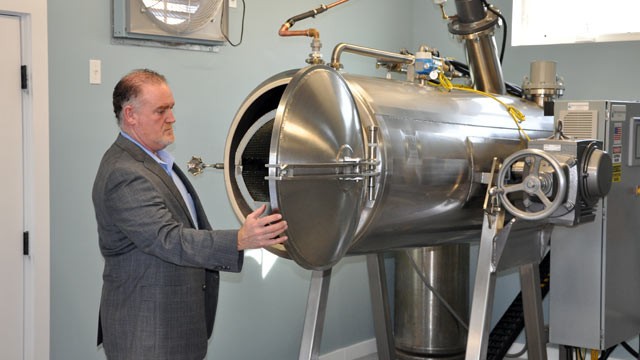Alkaline Hydrolysis: Insights from Your Colleagues
Article By: Samantha Wilson-Sieber
Alkaline hydrolysis, flameless cremation. It’s an option that a handful of pioneers are now offering their families, each with slightly different marketing strategies. Many states have already approved alkaline hydrolysis as an option for human disposition. Some states are pending approval right now, as you read this article. We sat down with four funeral directors who encouraged their regulators to allow them to become industry leaders.
Mark Riposta of Riposta Funeral Home and Direct Cremation of Maine has been vocal about his interest in alkaline hydrolysis since early 2010. His low-temperature system was delivered to his Searsport crematory on March 22, 2012, and he performed his first flameless cremation on March 23.
Ryan Cattoni is a licensed funeral director in South Holland, Illinois. His company, AquaGreen Dispositions, offers alkaline hydrolysis services to the greater Chicago area. He chose a high-temperature alkaline hydrolysis system for his facility.
Drew Gray is on the cusp of being the first industry leader in Canada to offer alkaline hydrolysis. Yesterday he received delivery of his low-temperature system to his funeral home, Gray’s Funeral Chapel in Prince Albert, Saskatchewan.
Curt DeBaun III is owner and operator of DeBaun Funeral Homes & Crematory in Terre Haute, Indiana. DeBaun, like many others, is eagerly awaiting approval for the process in his state.
Why did you make the move to offer alkaline hydrolysis?
Riposta: I was reading a trade journal and realized this was the future of cremation – kind of like an iPod versus an 8-Track. It’s the environmentally responsible choice for the future.
Cattoni: I truly believe that it’s a greener and gentler choice than burial and flame cremation. In searching for new, innovative ideas in the funeral industry, I decided that alkaline hydrolysis was the right choice.
Gray: My municipality will not allow flame cremation on my premises due to real and/or perceived air emissions. Thus began my search for incineration alternatives.
DeBaun: One day, I was sitting in my office when I noticed smoke from our crematory drifting past my window and enveloping the neighborhood. At that point, I decided to do whatever it took to have the first alkaline hydrolysis unit in Indiana.
What has been your experience offering the service to families?
Riposta: It has been easy, very natural. I just had to believe in it first. Flameless cremation makes environmental sense to my families.
Cattoni: I find it’s easy to offer something when you are so passionate about it and truly feel that you are making a difference. Many of the families are choosing alkaline hydrolysis because they do not want burial, so their other option is cremation. I believe water is easier on the mind than fire. It’s a green and gentle choice.
Gray: I began speaking with my families about their options ahead of time. The reaction towards alkaline hydrolysis has been extremely positive. I have families who have AH documented on their preneed, anticipating the process initiative.
DeBaun: Without exception, everyone in the public that I have mentioned the AH process to has been not only receptive, but voiced a preference over cremation.
How do you view the industry’s response?
Riposta: I could go on and on about this, but once the public is informed and starts asking for this service – that’s when you’ll see the industry respond. The process works for our staff and families. I have plans for at least four more systems by the end of 2014.
Gray: The AH technology is new enough that unless you have a pressing need in your market, the old technology of flame incinerative cremation is what we are familiar with and lean to. In Saskatchewan, biomedical waste is trucked to a neighboring province that still allows incineration. In time, this will change as well and alternate, cleaner processes will prevail out of necessity. Our funeral industry will need to follow suit at some point. I feel that I just got ahead of the curve a bit.
DeBaun: Any resistance that exists is from the funeral directors, much like the resistance given 25 years ago concerning cremation. We are a stubborn group, and because of this, I actually am surprised to see proposed legislation here in Indiana to approve AH. I feel that if left solely to the State Board of Funeral Service, it would be several years in coming.
Cattoni: I’ve been surprised by my families. I originally thought people would choose this method solely for the environmental benefits. My families are choosing alkaline hydrolysis because they are not comfortable with cremation by fire. They are relieved there is an alternative. That is the curveball the industry didn’t expect.
Perhaps simplicity says it best. We asked our funeral directors to describe alkaline hydrolysis in three words. Mark Riposta chose responsible, caring, and complete. Drew Gray stated clean, gentle, and respectful. Curt DeBaun believes it to be, “simpler than cremation.” Ryan Cattoni left us with, “future of industry.”
About Author
Samantha “Sam” Wilson-Sieber, BS-Biology, Purdue University, is VP Research at Bio-Response Solutions, Inc., where she leads implementation of the alkaline hydrolysis product lines for both the human and pet systems. Sam is also responsible for regulatory compliance and assists customers with the approvals processes at State and Local levels.




